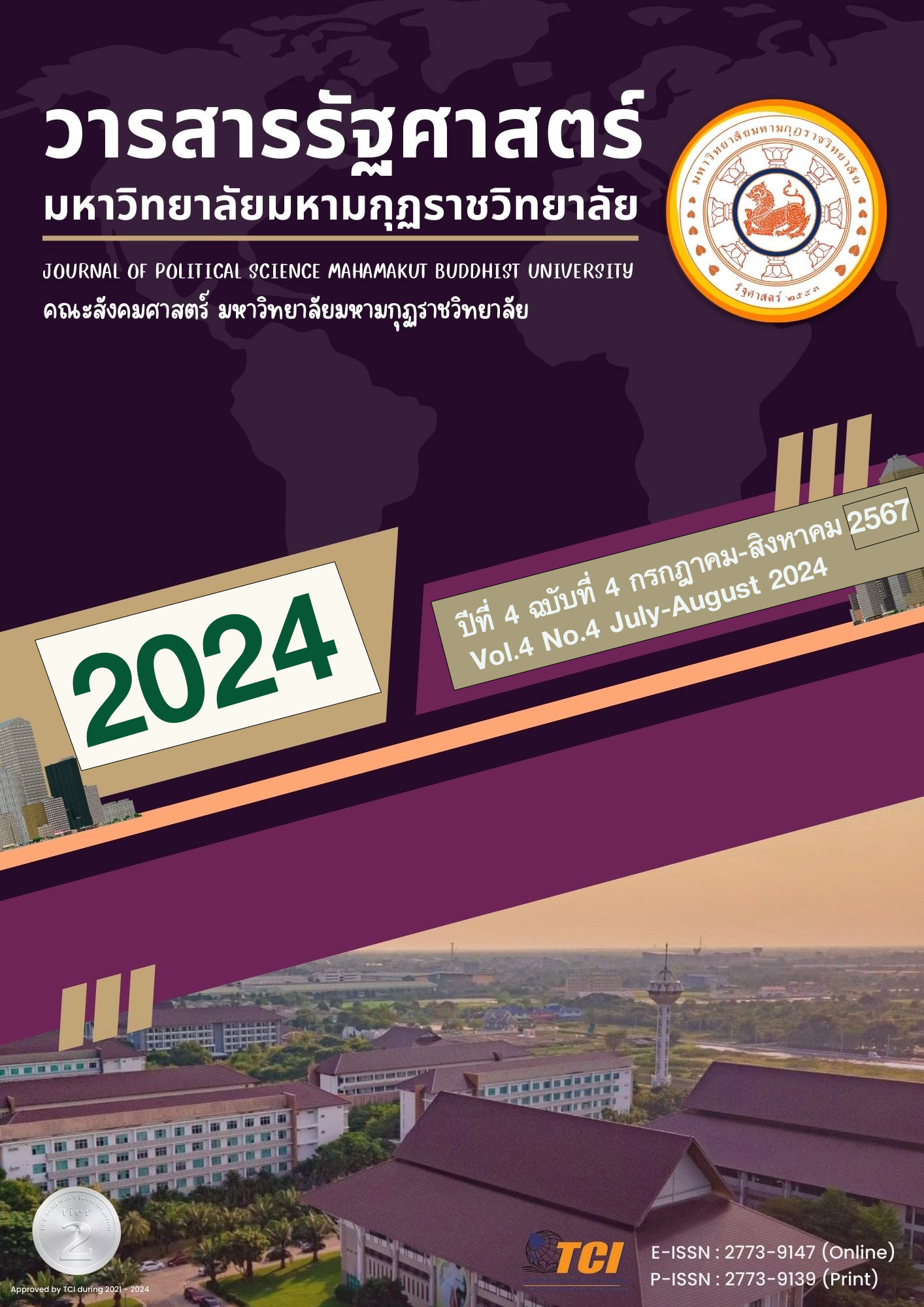LOCAL COMMUNITY ATTITUDES TOWARD THE IMPACTS OF SPORTS TOURISM DEVELOPMENT IN CHONBURI PROVINCE
Main Article Content
Abstract
This research aims to investigate: 1) the impacts of sports tourism development in Chonburi Province, 2) the community's attitudes towards sports tourism development in Chonburi Province, and 3) the factors influencing the community's attitudes towards sports tourism development. This is an exploratory study with a sample size of 400 residents in Chonburi Province, particularly in the areas of Bangsaen and Pattaya. Inferential analysis, specifically multiple regression analysis, was used to examine the relationship between the impacts of sports tourism development and the community's attitudes.
The results revealed that respondents generally agreed with the positive impacts of sports tourism development, especially in terms of government and relevant agencies' support, as well as economic and social benefits. However, they disagreed with the environmental impacts. The analysis found that government and relevant agencies' support had a positive influence on the community's attitudes. Increased support led to more positive attitudes (Beta = .433, t = 7.875). Conversely, environmental impacts had a negative influence, with increased perceived environmental impacts leading to less favorable attitudes towards sports tourism (Beta = -.153, t = -3.448).
The findings highlight the importance of managing and mitigating environmental impacts, as well as strong government support, to promote sustainable sports tourism.
Article Details

This work is licensed under a Creative Commons Attribution-NonCommercial-NoDerivatives 4.0 International License.
References
กระทรวงการท่องเที่ยวและกีฬา. (2566). สถิติด้านการท่องเที่ยว ปี 2566. เรียกใช้เมื่อ 23 มิถุนายน 2567 จาก https://www.mots.go.th
การท่องเที่ยวแห่งประเทศไทย. (2566). การท่องเที่ยวเชิงกีฬาในประเทศไทย. เรียกใช้เมื่อ 23 มิถุนายน 2567 จาก https://www.tourismthailand.org
ธีรวุฒิ เอกะกุล. (2543). ระเบียบวิธีวิจัยทางพฤติกรรมศาสตร์และสังคมศาสตร์. อุบลราชธานี: สถาบันราชภัฎอุบลราชธานี.
มติชนออนไลน์. (2560). ผ่ายุทธศาสตร์กีฬา’ชลบุรี’ ยกระดับเมืองท่องเที่ยว+สปอร์ตซิตี้. เรียกใช้เมื่อ 22 สิงหาคม 2567 จาก https://www.matichon.co.th/sport-slide/news_563634
สำนักงานจังหวัดชลบุรี. (2565). แผนพัฒนาจังหวัดชลบุรี 5 ปี พ.ศ.2566 - 2570. เรียกใช้เมื่อ 22 สิงหาคม 2567 จาก http://www.chonburi.go.th/website/ info_organ/about5/topic63
Ap, J., & Crompton, J. L. (1998). Developing and testing a tourism impact scale. Journal of Travel Research, 37(2), 120-130.
Getz, D. (1998). Event tourism and the authenticity dilemma. In D. Getz (Ed.), Event Management & Event Tourism (pp. 409-423). Cognizant Communication Corporation.
Gibson, H. J. (2006). Sport tourism: Concepts and theories. Sport in Society, 9(2), 133-141.
GlobalData. (2023). Asia Pacific Sports Tourism Market Size, Share & Trends Analysis Report by Type (Sports Participation, Sports Event Tourism), Forecast, 2023-2030. https://www.globaldata.com
González-García, R. J., Añó-Sanz, V., Parra-Camacho, D., & Calabuig-Moreno, F. (2018). Perception of residents about the impact of sports tourism on the community: Analysis and scale-validation. Journal of Physical Education and Sport, 18(1), 149-156. https://doi.org/10.7752/jpes.2018.01019
Gossling, S. (2002). Global environmental consequences of tourism. Global Environmental Change, 12(4), 283-302.
Hall, C. M. (2008). Tourism planning: Policies, processes and relationships. Pearson Education.
Hall, C. M. (2015). Rethinking Collaboration and Governance in Regional Australia. Springer.
Herbold, V., Thees, H., & Philipp, J. (2020). The host community and its role in sports tourism—Exploring an emerging research field. Sustainability, (24), 10488. https://doi.org/10.3390/su122410488
Higham, J., & Hinch, T. (2009). Sport and tourism: Globalization, mobility and identity. Oxford: Butterworth-Heinemann.
Hinch, T., & Higham, J. (2011). Sport Tourism Development (2nd ed.). Channel View Publications.
Liu, D. (2016). Social impact of major sports events perceived by host community. International Journal of Sports Marketing and Sponsorship, 17(1), 78-91.
Mair, J., Chien, P. M., Kelly, S. J., & Derrington, S. (2021). Social impacts of mega-events: A systematic narrative review and research agenda. Journal of Sustainable Tourism, 29(6), 1080-1099. https://doi.org/10.1080/09669582.2020.1870989
Manzoor, F., Wei, L., Asif, M., Haq, M. Z. U., & Rehman, H. U. (2019). The contribution of sustainable tourism to economic growth and employment in Pakistan. International Journal of Environmental Research and Public Health, 16(16), 3785.
Morfoulaki, M., Myrovali, G., Kotoula, K.-M., Karagiorgos, T., & Alexandris, K. (2023). Sport tourism as driving force for destinations’ sustainability.Sustainability, 15(3), 2445. https://doi.org/10.3390/su15032445
Njoroge, J. M., Atieno, L., & Vieira Do Nascimento, D. (2017). Sports tourism and perceived socioeconomic impact in Kenya: The case of Machakos County. Tourism and Hospitality Management, 23(2), 195-217.
Raso, G., & Cherubini, D. (2024). The sport tourism and regional economic development: A systematic review. Scientific Journal of Sport and Performance, 3(1), 108-121. https://doi.org/10.55860/JKWX7277
Ritchie, B. W., & Adair, D. (2004). Sport tourism: Interrelationships, impacts and issues. Channel View Publications.
Sinclair, M. T. (1998). Tourism and economic development: A survey. Journal of Development Studies, 34(5), 1-51.
Smith, J. (2020). Economic Impacts of Sports Tourism: A Case Study. Journal of Sports Economics.
The Pattaya News. (2023). Thai and International Runners Join Bangsaen 42 Chonburi Marathon. The Pattaya News. Retrieved from https://thepattayanews.com/2023/11/06/12000-thai-and-international-runners-join-bangsaen-42-chonburi-marathon/
The Government Public Relations Department (2023). Domestic tourism statistics by province in 2023. Retrieved from https://thailand.go.th/issue-focus-detail/001_02_164-2-d2
United Nations World Tourism Organization. (2023). International Tourism Highlights, 2023 Edition. https://www.unwto.org


